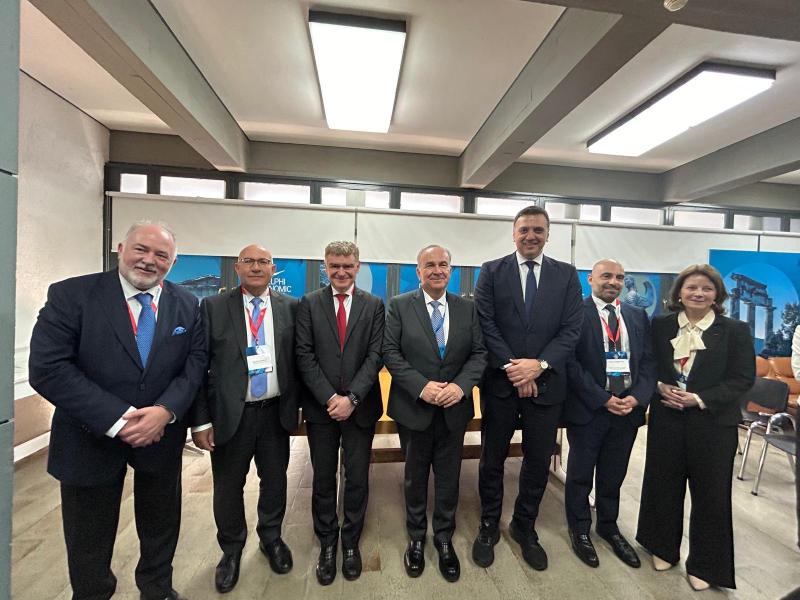
- The EIB is lending Greece €220 million to buy fire engines, aircraft and rescue vehicles and upgrade services needed for natural disasters
- New loan brings total EIB support for Greek civil protection and disaster preparedness to €595 million
The European Investment Bank (EIB) is lending Greece €220 million to help protect against floods and wildfires occurring more often as a result of climate change as well as against other natural disasters such as earthquakes. The funding will be used to buy fire engines, firefighting planes and helicopters, drones, rescue vehicles and control centres.
The support aids a multi-year Greek plan – AEGIS – to strengthen the country’s civil-protection mechanism. Greece was hit by deadly wildfires in 2017 and 2018, and devastating wildfires in 2021 and 2023, as well as by catastrophic flooding in September 2023.
“We have seen first-hand the devastation caused by deadly wildfires and floods in Greece in recent years,” said EIB Vice-President Kyriacos Kakouris. “This support will help the country respond more quickly and effectively when disaster strikes, protect lives and better prepare for natural disasters and pandemics.”
The investment is part of the EIB Group’s EU-wide Climate Adaptation Plan and follows an initial loan to Greece of €375 million in January 2021.
“When I took charge of the portfolio at the Ministry of Climate Crisis and Civil Protection, I pledged to the Prime Minister and my fellow citizens that I would implement the Aegis program as quickly as possible. It is a significant, emblematic program for which Prime Minister Kyriakos Mitsotakis secured funds worth €2.1 billion euros with the aim of upgrading the civil protection and protecting the country against the natural disasters caused by the rapidly evolving climate crisis across the planet. I am proud that within a few months we have managed not only to put all of the projects to tender, but we are also progressing to the next stage, their contractualization. I want to warmly thank the European Investment Bank, which is one of the three sources of funding for Aegis, for the excellent cooperation that we have developed during the effort to implement a program that is vital for the protection of human life, fellow citizens’ property and, of course, the environment and our country’s forestry resources,” said Greek Minister of Crisis Management and Civil Protection Vassilis Kikilias.
“Dealing with the consequences of the climate crisis is one of the biggest challenges the modern world faces. The destruction caused by Storm Daniel show the importance of common European policy, the effectiveness of European funds and the part played by programs like Aegis. The Greek government continues to be in the front line and to cooperate with organisations like the EIB for the benefit of civil protection and the protection of the environment,” said Alternate Minister of Economy and Finance, Nikos Papathanasis.
The new loan, along with the one in 2021, represents the first targeted direct EIB support for civil protection and disaster preparedness in Greece. It is also the largest amount of EIB aid for disaster management and response in Europe. The programme, to be implemented until 2025, will restructure civil protection in Greece to enable quicker responses, strengthened local preparedness and coordination and improved equipment.
Strengthening civil protection across Greece
The new support covers state-of-the-art equipment for the Hellenic Fire Service, including helicopters and aircraft to fight wildfires and conduct evacuations in medical emergencies.
Disaster prevention, preparedness and response will be transformed by the creation of 13 regional civil-protection teams and new communications networks and information-technology systems across the country.
Ensuring best practice in disaster prevention
Experts from the Greek government and EIB have been working together since the 2021 loan agreement and will continue to do so under the new funding accord to use best-practices from across Europe. That in turn will feed back into disaster-prevention measures in Europe.
“The EIB, through its Advisory Services Hub, and the Greek authorities will share best practices during the implementation of the investments and enable experience from this visionary scheme to benefit future projects backed by the EIB elsewhere,” said Kakouris.
Improving civil protection cooperation in Europe
This latest support will improve European coordination of civil protection and disaster response. Specialised equipment can be used to help other countries in times of need under the rescEU reserve. This enables firefighting planes and helicopters, planes for evacuating people in medical emergencies, and a stockpile of medical equipment and field hospitals from EU Member States to be deployed.
EIB
The European Investment Bank (ElB) is the long-term lending institution of the European Union, owned by its Member States. It finances sound investments that contribute to EU policy objectives. EIB projects bolster competitiveness, drive innovation, promote sustainable development, enhance social and territorial cohesion, and support a just and swift transition to climate neutrality. EIB projects bolster competitiveness, drive innovation, promote sustainable development, enhance social and territorial cohesion, and support a just and swift transition to climate neutrality.
The EIB Group, which also includes the European Investment Fund (EIF), signed a total of €88 billion in new financing for over 900 projects in 2023. These commitments are expected to mobilise around €320 billion in investment, supporting 400 000 companies and 5.4 million jobs.
All projects financed by the EIB Group are in line with the Paris Climate Accord. The EIB Group does not fund investments in fossil fuels. We are on track to deliver on our commitment to support €1 trillion in climate and environmental sustainability investment in the decade to 2030 as pledged in our Climate Bank Roadmap. Over half of the EIB Group’s annual financing supports projects directly contributing to climate change mitigation, adaptation, and a healthier environment.
Approximately half of the EIB's financing within the European Union is directed towards cohesion regions, where per capita income is lower. This underscores the Bank's commitment to fostering inclusive growth and the convergence of living standards.


